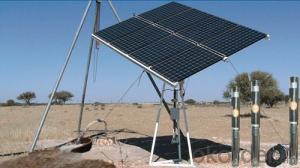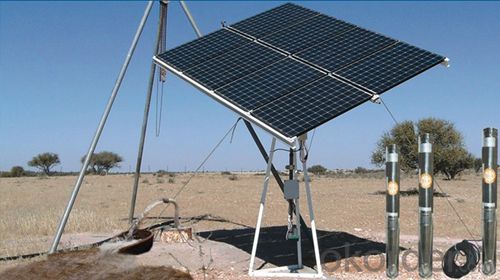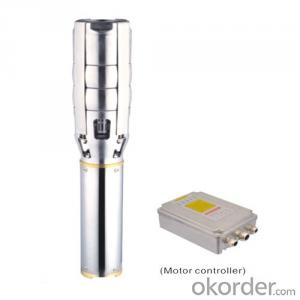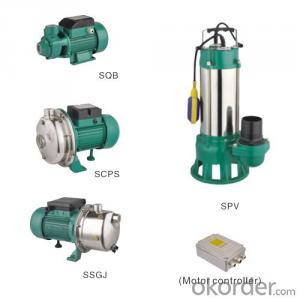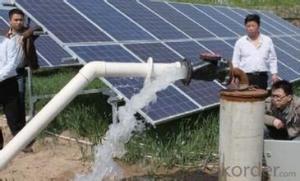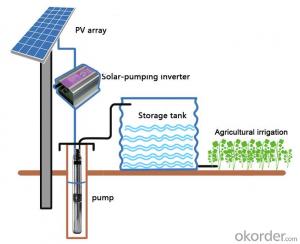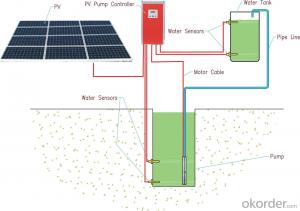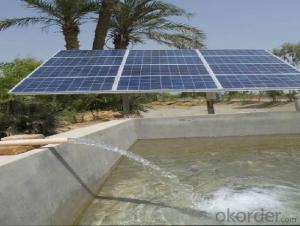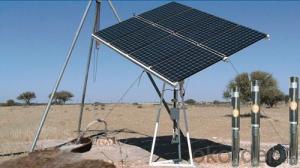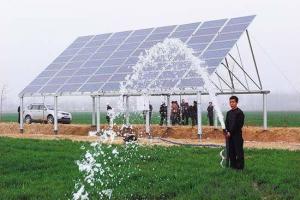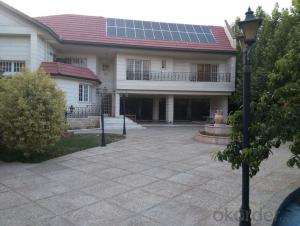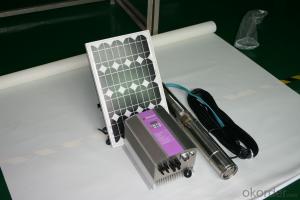Buy Solar Pump:Solar Powered Water Pump and Solar Water Heater Panels
- Loading Port:
- Shanghai
- Payment Terms:
- TT OR LC
- Min Order Qty:
- 1 set
- Supply Capability:
- 1000 set/month
OKorder Service Pledge
OKorder Financial Service
You Might Also Like
Solar Powered Water Pump Solar Water Heater Panels
DC solar water pumping system consists of the motor, pump, controller, solar array and some other accessories, such as water level sensor, float switch, etc. Considered that storing water is more efficient than storing electricity, the system is designed to directly drive the pump without battery which can reduce the construction and operating cost and routine maintenance effectively.The PV array consists of multiple solar panels connected in series/parallel, which can supply the whole system as power source by converting the absorbed solar radiation energy to the electrical energy. The pump driven by a brushless DC permanent magnet motor draws water from deep-well or river. The pumped water is then fed into reservoir or water tank, or connected to the irrigation system or fountain system directly.
Advanced Technology
Applications Innovation
The efficiency of DC brushless permanent magnet motor has been increased up to 25% in comparison with traditional asynchronous motor.
Technology Innovation
Stator and rotor are sealed by environment friendly casting resin.Motor insulation resistance can be hold higher than 300MΩfor more than 10 years, which consumedly increased the security and reliability of the submersible motor.
Structure Innovation
Casting resign technology processed stator and rotor as well as the water lubricated bearing make the submersible pump environment friendly.
Feature
High Efficiency & High Reliability
DC Brushless Permanent Magnet Motor
Minimum Maintenance, long Service Life
Environment Friendly Materials, Lubricated Without Oil
Application
Village or Family Water Supply
Animal Drinking Water & Livestock Watering
Garden/Courtyard Irrigation
Swimming Pool
Water Supply for Bivouac or Camping Car
Water Supply for Remote Area
Automatic Control
Operate Automatically, No Need Watching
Maximum Power Point Tracking (MPPT)
Dry-run Protection
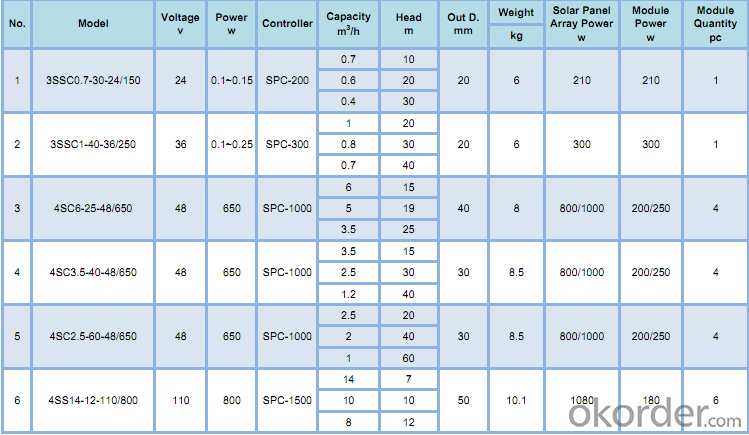
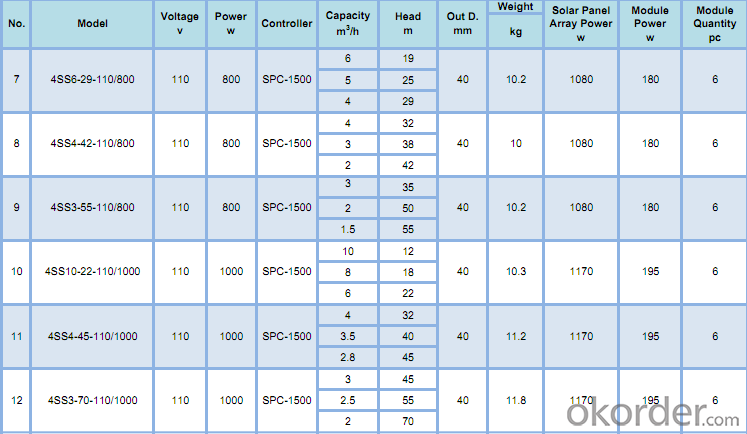
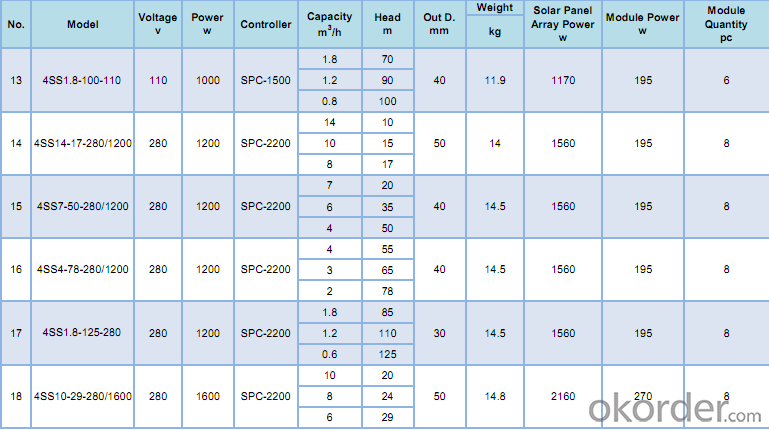
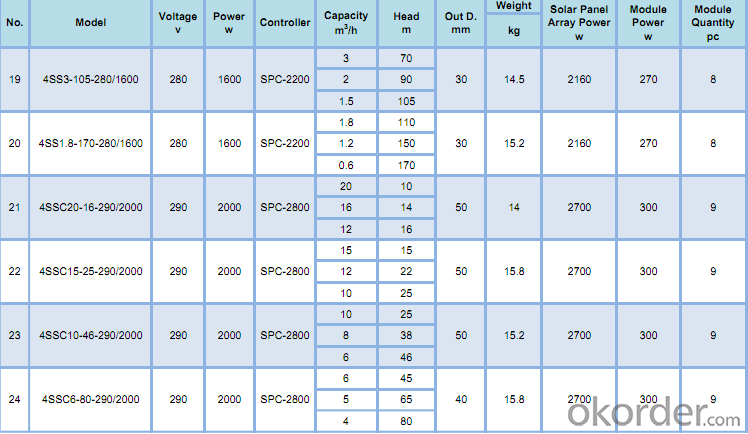
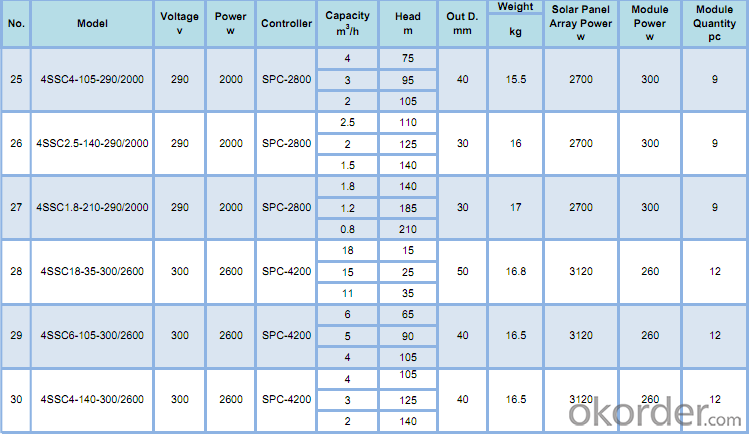
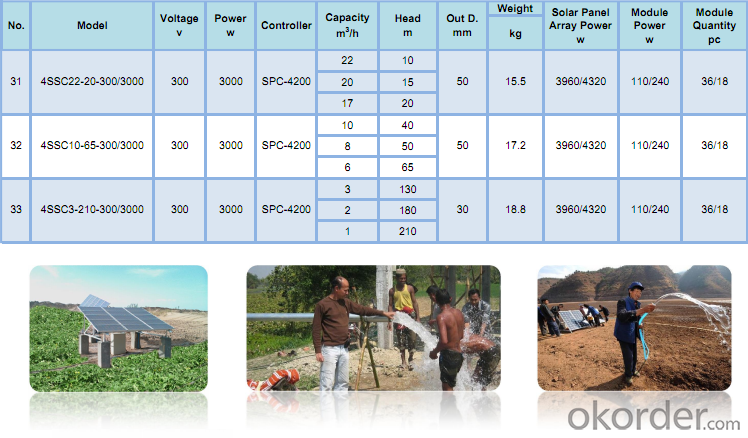
- Q: Are there any government incentives or subsidies for installing a solar pump?
- Installing a solar pump is eligible for government incentives and subsidies. Governments worldwide recognize the significance of renewable energy and the advantages of utilizing solar power for water pumping systems. These incentives and subsidies are designed to promote the adoption of solar pumps as an eco-friendly and sustainable alternative to traditional systems. The availability of specific incentives and subsidies may vary depending on the country or region. However, they typically include financial aid, tax credits, grants, and low-interest loans. For instance, in the United States, the federal government provides a federal investment tax credit (ITC) that enables individuals and businesses to deduct a portion of their solar pump installation costs from their federal taxes. Some states may even offer additional incentives alongside the federal ITC. Moreover, international organizations like the World Bank offer funding and support for solar pump installations in developing nations. These initiatives aim to enhance access to clean water and boost agricultural productivity in areas with unreliable or nonexistent electricity supply. To obtain detailed information about the incentives and subsidies available in your area, it is recommended to consult local government agencies, energy departments, or renewable energy associations. By taking advantage of these government programs, individuals and businesses can significantly reduce the initial expenses of installing a solar pump while contributing to a more sustainable future.
- Q: Can solar pumps be used for swimming pools or ponds?
- Yes, solar pumps can be used for swimming pools or ponds. They are energy-efficient and environmentally friendly, utilizing solar power to circulate and filter water. This eliminates the need for grid electricity and reduces operational costs. However, it is important to ensure that the solar pump selected is appropriately sized for the volume of water and specific requirements of the pool or pond.
- Q: Can a solar pump be used for water supply in national parks or wildlife reserves?
- Yes, a solar pump can definitely be used for water supply in national parks or wildlife reserves. Solar pumps are an excellent and sustainable alternative to traditional pumps that require electricity or fuel. They harness the power of the sun to pump water from sources such as rivers, lakes, or wells and supply it to various locations within the parks or reserves. One of the main advantages of using solar pumps in these areas is their environmental friendliness. National parks and wildlife reserves are dedicated to preserving and protecting the natural ecosystem, so using solar pumps aligns perfectly with their goals. Solar pumps produce clean energy, reducing greenhouse gas emissions and minimizing the ecological impact on the surrounding environment. Furthermore, solar pumps are highly reliable and require minimal maintenance. They operate silently and efficiently, ensuring a consistent water supply for various purposes within the parks or reserves. This can include providing water for drinking, irrigation of plants, or even for wildlife habitats and watering holes. In remote areas, where access to electricity may be limited or non-existent, solar pumps are particularly beneficial. They can be installed in off-grid locations, eliminating the need for extensive electrical infrastructure and reducing costs associated with traditional pumps. Additionally, solar pumps can be easily integrated with other renewable energy sources, such as solar panels or wind turbines, to create a sustainable and self-sufficient water supply system. Overall, solar pumps are a viable and practical option for water supply in national parks or wildlife reserves. They offer numerous benefits, including environmental sustainability, reliability, and cost-effectiveness. By harnessing the power of the sun, these pumps can contribute to the conservation efforts of these protected areas while ensuring a reliable water supply for both humans and wildlife.
- Q: Are solar pumps suitable for both residential and commercial use?
- Solar pumps are suitable for both residential and commercial use, offering a great deal of versatility. They can be utilized for irrigation, water supply, and other fluid management tasks. Both individuals and businesses can benefit from solar pumps as they provide several advantages. The first advantage is their environmental friendliness. By using clean and renewable energy from the sun, solar pumps help reduce carbon emissions and decrease reliance on non-renewable energy sources. This makes them an excellent choice for those who want to adopt sustainable practices. Furthermore, solar pumps can lead to significant long-term cost savings. Although the initial investment may be higher compared to traditional pumps, solar pumps have minimal operating and maintenance expenses since they do not require fuel or electricity to function. This can result in substantial utility bill savings for both residential and commercial users. Moreover, solar pumps are highly reliable and efficient. They can operate independently of the electrical grid and can be installed in remote areas where electricity access may be limited or expensive. Additionally, solar pumps have low maintenance requirements, with many models designed to work for several years without major servicing or component replacements. Lastly, solar pumps offer scalability, meaning they can be customized to meet the specific needs of both residential and commercial users. Whether it's a small residential garden or a large-scale agricultural or industrial operation, solar pumps can be sized and designed accordingly. In conclusion, solar pumps are a viable choice for both residential and commercial use. Their environmental benefits, cost-effectiveness, reliability, and scalability make them an appealing option for individuals and businesses seeking to harness the power of the sun for their pumping requirements.
- Q: What size solar pump do I need for my application?
- The size of the solar pump you need for your application depends on various factors such as the desired flow rate, total dynamic head, and the specific requirements of your application. It is recommended to consult with a solar pump supplier or an expert in the field who can evaluate your needs and provide you with the appropriate sizing recommendation.
- Q: What is the maximum temperature range in which a solar pump can operate?
- The maximum temperature range in which a solar pump can operate depends on various factors such as the type of solar pump, its components, and the environmental conditions. However, typically, most solar pumps are designed to operate within a temperature range of -20°C to 50°C (-4°F to 122°F). It is important to note that extreme temperatures, especially at the upper or lower limits of this range, may affect the performance and efficiency of the solar pump. High temperatures can potentially cause overheating and damage to the pump's components, while extremely low temperatures may lead to freezing and subsequent malfunctioning of the pump. To ensure optimal operation and longevity of a solar pump, it is recommended to consult the manufacturer's specifications and guidelines, as they may provide more specific temperature ranges for the particular model. Additionally, implementing proper insulation and protection measures in extreme climates can help maintain the efficiency and reliability of the solar pump.
- Q: Can a solar pump be used for water purification or filtration?
- Water purification or filtration can be achieved using a solar pump. These pumps utilize solar energy to operate the pumping mechanism, enabling the extraction of water from wells or bodies of water. The water obtained can then undergo purification or filtration for diverse applications. To purify water with a solar pump, it is necessary to include supplementary components like filters or purifiers within the system. These additions serve to eliminate impurities, contaminants, and microorganisms from the water, rendering it suitable for consumption or other uses. Water filtration can also be accomplished using a solar pump by passing the water through a filtration system. This system may encompass several filtration stages, including sediment filters, carbon filters, or membrane filters, depending on the desired water quality level. Utilizing a solar pump for water filtration offers particular advantages in regions where clean water access is limited, as it presents an eco-friendly and sustainable solution. In conclusion, a solar pump proves to be an effective and efficient tool for water purification or filtration. By harnessing renewable solar energy to power its pumping mechanism and incorporating additional purification or filtration components, a solar pump helps ensure the availability of clean and safe water for diverse purposes.
- Q: Can a solar pump be used in areas with limited access to transportation for maintenance visits?
- Yes, a solar pump can be used in areas with limited access to transportation for maintenance visits. Solar pumps are designed to be low-maintenance and can operate for long periods without the need for frequent maintenance. Additionally, they do not require a constant power supply as they rely on solar energy. This makes them suitable for remote areas where transportation for maintenance visits may be challenging.
- Q: Are there any limitations to the type of control system that can be used with a solar pump?
- Yes, there are limitations to the type of control system that can be used with a solar pump. One limitation is the availability of sunlight. Solar pumps rely on solar panels to generate electricity, so if there is insufficient sunlight, the pump may not work optimally or at all. Additionally, the size and capacity of the solar panels also impact the pump's performance. Other limitations include the need for proper installation and maintenance, as well as the compatibility of the control system with the specific solar pump model. Overall, while solar pumps offer sustainable and efficient water pumping solutions, their control systems are subject to certain limitations.
- Q: Can a solar pump be used for water supply in remote farms or ranches?
- Yes, a solar pump can definitely be used for water supply in remote farms or ranches. Solar pumps are an excellent solution for areas where there is no access to grid electricity. They use solar energy to power the pump and do not require any fuel or electricity from the grid. Solar pumps are particularly beneficial for remote farms or ranches as they provide a cost-effective and sustainable solution for water supply. They eliminate the need for costly and unreliable fuel-powered generators or long power lines to bring electricity to these remote locations. Furthermore, solar pumps are easy to install and require minimal maintenance. They are designed to work efficiently even in harsh weather conditions and can pump water from deep wells or boreholes. They can be used for a variety of water supply applications such as irrigation, livestock watering, or even domestic use. The use of a solar pump for water supply in remote farms or ranches offers numerous advantages. It reduces dependence on fossil fuels, lowers operational costs, and promotes environmental sustainability. Additionally, it provides a reliable and continuous water supply, ensuring the smooth functioning of agricultural activities in these remote areas. In conclusion, a solar pump is a highly suitable and practical option for water supply in remote farms or ranches. It offers an affordable and sustainable solution, providing a reliable source of water for various agricultural needs.
Send your message to us
Buy Solar Pump:Solar Powered Water Pump and Solar Water Heater Panels
- Loading Port:
- Shanghai
- Payment Terms:
- TT OR LC
- Min Order Qty:
- 1 set
- Supply Capability:
- 1000 set/month
OKorder Service Pledge
OKorder Financial Service
Similar products
Hot products
Hot Searches
Related keywords
